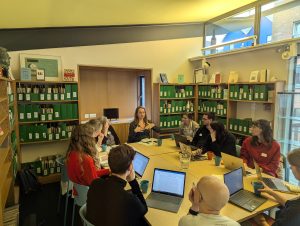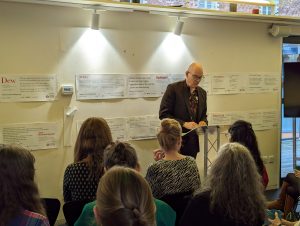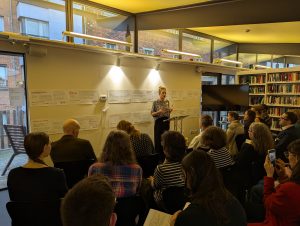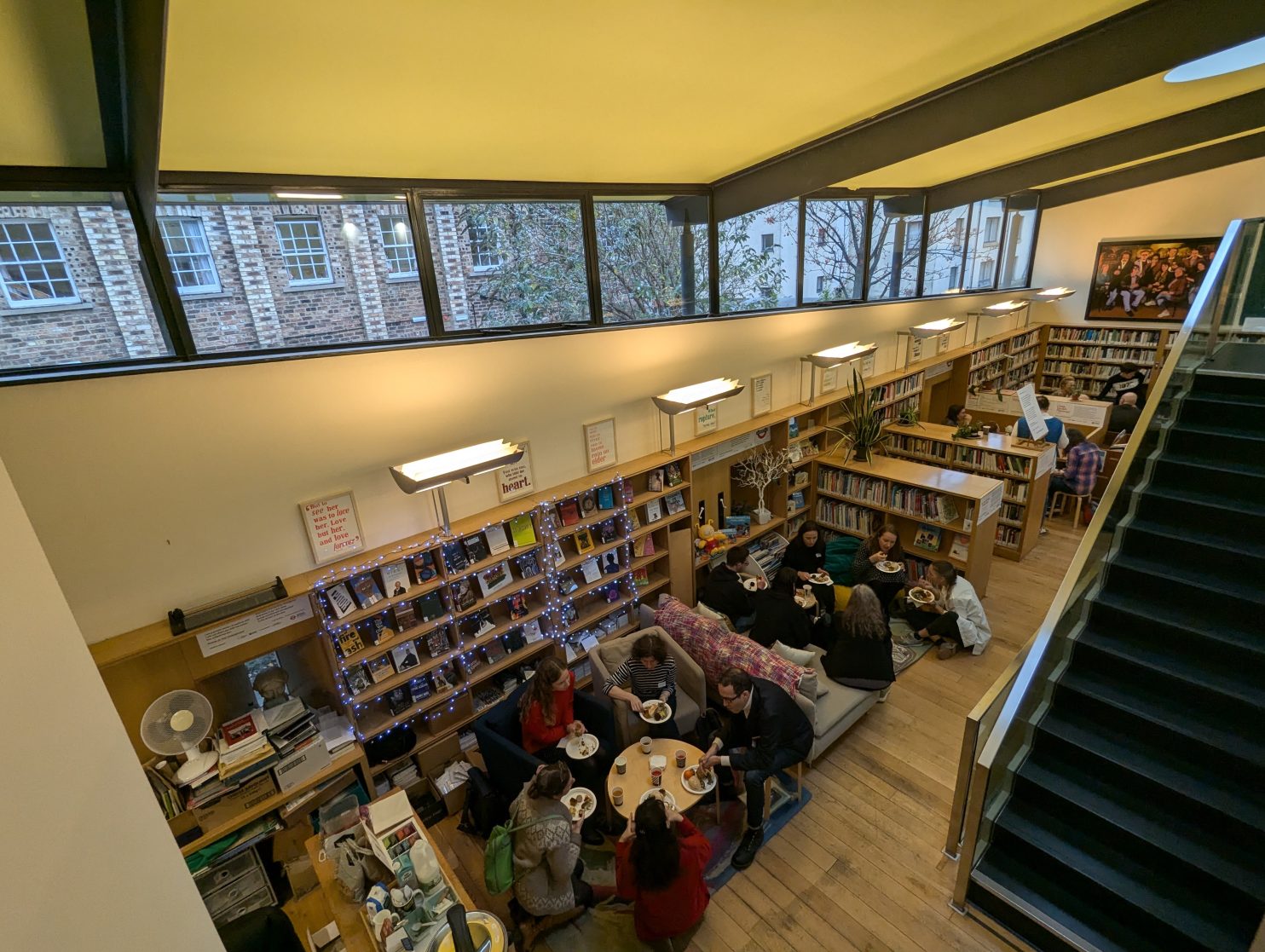January 1, 2025
Autumn event in Edinburgh
Read more about the author-translator workshop SELTA held at the Scottish Poetry Library in Edinburgh.
As 2024 draws to a close, it’s time for reflection- and a chance to look back at a dreich day in autumn, when a group of Swedish authors and translators from the language gathered in Edinburgh for SELTA’s autumn event. This took the form of a full-day translation workshop with visiting authors Hanna Nordenhök, Jörgen Gassilewski, and Lida Starodubtseva at the Scottish Poetry Library. The event was well-attended and well-enjoyed: we look forward to more like it in the future!
One of our participating authors, Lida Starodubtseva, kindly wrote a playful piece in response to the workshop, which we would like to share here.
*
I’ll start with a quote paraphrased from Athena Farrokhzad: isn’t every text a river?
Doesn’t every text have two riverbanks: the translated, and the still not translated? Perhaps even: the translatable and the untranslatable. Do you remember the old riddle about the wolf, the goat and the head of cabbage that have to be carried across a river in a boat – where naturally they cannot all be present at the same time? The wolf wants to eat up the goat, the goat wants to eat up the head of cabbage. Do you remember how sweat-inducing the riddle used to be when it was given out as an extra task in – maybe fifth grade? Surely the same feeling can appear when you’re sitting with a translation, sunken deep into a process where the semantics, the phonetics and the style don’t want to sit together in the same boat? The toilsome puzzling ahead of each crossing: out with this expression and in with this rewriting, and how does that sound? Got no further. Sigh.
At the SELTA seminar that took place a few weeks ago in Edinburgh, I was for sure not taking part as a translator, rather as an author. But: once a translator, always a translator. The wolf, the goat, the head of cabbage. A) I write in a language that is not my first language and which I began to speak somewhat fluently only in my twenties – a slightly peculiar Swedish that carries traces of both my Russian and a sort of general linguistic abstraction and enstrangement. B) Now a text from my book is to be translated to another language, English, and the translator – the ferryman who carries meaning across from one bank to the other – has enough of their own matters to deal with: can they be bothered to get stuck into a source text that has a peculiar upbringing? C) At the other end of the process, there is an imagined reader who shouldn’t need to know anything in advance, be that about the author’s and the original text’s suppositions or the ferryman’s concerns. The reader has the right to expect… reading, and nothing else. The reader should not need to think about why “the voice fumbles over the neighbouring tones” is not a normal description; the reader should feel a sting of oddness but travel further along in the text, unencumbered. Or: whether wooden staircases resonate “meekly” – how do they sound then, actually? Meekly, with a soft echo, tentatively, modestly? Is it the physically perceptible sound that is being described, or the child’s feeling of being carried, supported, comforted by the staircase that has been tramped along so many times before?
To those dear translators who have sat trying to find a way to solve this: my immense gratitude!
So then: we have all learnt how the riddle is to be solved. A) You carry the head of cabbage across, then you travel back to fetch the goat. B) Once on the other side of the river again, you leave the goat and bring back the head of cabbage to the starting point where the wolf is waiting. C) For the final round, you carry the wolf and the head of cabbage across together. Everyone is happy, no one has come to harm.
You reach, as is so often the case, a solution that seems ok. A text that does not challenge too much, unbothersome formulations, descriptions that feel… normal.
But imagine if the wolf is vegetarian. Imagine if the goat is actually the big billy-goat, Bruse, who can knock the wolf down. Imagine if there are others on the bank that the riddle forgot to mention. Think if all the solutions that look correct are just half-decent compromises – and the one that looks completely crazy is the only one that really creates meaning. Make it queer, as the master translator John Swedenmark once wrote.
Isn’t every text a river – or the possibility of a river. This rhetorical question I will be saving for the wonderful future where I have the time to write flippant essays and need a suitable title for one of them, one that will be about collective translations of linguistically odd and fragile texts. “Possibility of rivers.” Or “Possibility of a river”? Does that sound normal? Or with a touch of oddness? That’s something we can discuss, should someone then wish to translate the essay into another language.
(Translated by Sophie Ruthven)

A number of the participants were also happy to share some reflections from the day. We hope they will bring back fond memories to those who were able to attend, and be inspiring to others!
Translator Alistair Gage:
As an employed commercial translator for the last 20-plus years, it was particularly rewarding to apply my mind to some literary translation again. The texts were suitably challenging and the whole day was very well organised. The Scottish Poetry Library was a perfect venue too.
It was also great to meet some “real” translators, rather than be sat in front of a computer screen on my own most of the working day, as seems to be the life of translators these days.
Nice that this meeting was held closer to (my) home too, and all in all, a most inspiring day.
Final year Edinburgh student Alex Kastel:
I found it interesting to compare and discuss the translations themselves, and to be able to compare the language to the authors’ intentions. As a student I felt less familiar with how professional translation work is conducted but it was interesting to get a sense of the backgrounds and connections of the different attendees’ to translating. I also found it surprising but also exciting that this style of discussion forum was rare and liked that everyone shared a feeling of novelty and enthusiasm towards it from swapping and contrasting ideas and interpretations.
And Elizabeth Lutz of UEA:
I really appreciated the format of the workshop, that it included short introductions by each of the authors and then we discussed their work in small groups around a round table. Everyone used the language they felt most comfortable with, Swedish or English. Breaks in between sessions provided opportunities to speak with the authors directly and to meet other translators. Almost everyone was new to me, since I only recently joined SELTA. I also got to talk with Lars Gassilewski about his writing process for both poetry and prose and the writers who influenced him. It was insightful to hear from other translators about decisions they struggle with in literary texts.
The Scottish Poetry Library was a lovely venue for the day and lunch was very good! I got to try thyme tea, which I’d never had before, and now it’s one of my favourites.
Translator Helen Robinson:
I really enjoyed the SELTA workshop. There was a good balance between the presentations by the authors and the translation break out groups. Thanks to everyone who worked hard to collate the translations and those who led the groups. It was great to meet so many translators.
Translator Kathy Saranpa:
For translators, who have must have one of the most solitary occupations on the planet, meeting up with our peers is always a treat. But attending a workshop together to work on texts with their authors present is an absolute goldmine. We can see each others’ thought processes in real time, decide whether our crazy ideas were way off base or a stroke of genius, and ask authors what they meant by phrases that may have made us scratch our heads. Not to mention the reactions authors have to hearing their works in English in several different versions, something that I find very gratifying. Who else but a translator can have almost as intimate a relationship with their creations as they do?
In October, several SELTA members gathered to work on texts by three Swedish authors who were present — Jörgen Gassilewski, Hanna Nordenhök and Lida Starodubtseva — and by one who wasn’t able to be present, Quynh Tran. It was hard to decide which two authors NOT to work with, as there were parallel sessions both morning and afternoon. I ended up in the group with Lida Starodubtseva in the morning, and it was an epiphany. Her native language is Russian, and I wasn’t aware of this when working on her texts. Some of the phrases I struggled most with were traces of Russian idioms in Swedish. There was also a missing comma that caused many of us trouble, and which she promptly replaced in her text. But since then I’ve been almost obsessed with the idea of language that ‘misbehaves’ and creates an additional layer of meaning and an enhanced richness.
The authorless afternoon session featured an interesting twist: there was a new first page. We discussed such issues as whether having the new information would change our translations in any way and what questions we would ask Tran if he had been able to be present. The issue of how Finland-Swedish the author was came up, as Tran was not born in Finland and no longer lives there, but debuted as a Finland-Swedish writer from Jakobstad.
The conversations outside the workshops were also incredibly rewarding, Not only the shop talk and the gossip, but also talking to students and younger translators and getting their perspectives on our career path, especially in light of technological developments such as AI. The Scottish Poetry Society was an outstanding venue for our workshop with its volumes of poetry to look at during breaks, the thought-provoking quotes on the walls, and the intriguing gift shop.
Many thanks and kudos are due to Ian Giles, who worked hard to organize this event, and the team that helped him. It was such a worthwhile experience for SELTA members and guests.

Translator and incoming SELTA Chair Nichola Smalley:
It’s always fascinating and terrifying to take part in these workshops. Fascinating because you get to engage so deeply with the texts concerned and you learn so much about your colleagues’ varied approaches and the choices they lead to, and terrifying because you’re forced to look closely at your own methods and confront your own mistakes and assumptions. Luckily, the supportive and collegiate spirit in which the workshop takes place renders moot any embarrassment at wonky choices. I took part in sessions with Lida Starodubtseva and Hanna Nordenhök, both translators themselves, and was charmed by the grace, insight and openness of both of them and impressed by my colleagues’ thoughtful responses to their texts, which each presented distinct yet head-scratching challenges. All in all a really valuable experience. Here’s to the next SELTA translation workshop!

We are grateful for the Scottish Poetry Library who permitted us to run the workshop in their wonderful venue, as well as of course to the authors and all the participants who contributed to a fantastic atmosphere.

